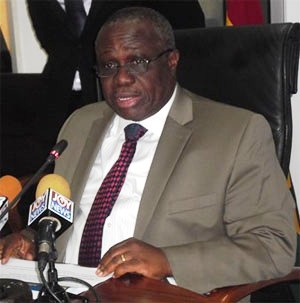 Dr Henry Kofi Wampah - BoG Governor
Dr Henry Kofi Wampah - BoG Governor
Ghana will miss its inflation target of 8 percent + or -2 for this year following current trends in the economy.
It might also not achieve single-digit inflation, a requirement for the use of a common currency in West Africa in 2016.
This suggest that price of items will still be on the high side, culminating in higher interest rates.
The Monetary Policy Committee (MPC) of the Bank of Ghana (BoG) increased its benchmark indicator, the policy rate, to 25 percent, the highest in over a decade this week to help curb inflation and lessen the depreciation of the Ghana cedi.
In its report, the bank said inflation expectations remain elevated and outside the medium term target band of 8±2 percent.
Following the last MPC, the Ghana Statistical Service has released three more readings of headline inflation. From 16.9 percent in May, CPI inflation increased sharply to 17.9 per cent in July, mainly reflecting the upward adjustments in petroleum and transport prices.
Some moderation occurred in August with inflation declining to 17.3 percent, still higher than the June reading of 17.1percent. Core inflation (CPI excluding energy and utilities), however, continued to rise, suggesting persistent underlying inflation pressures, the Bank of Ghana said.
“The current forecasts suggest that attainment of the medium-term inflation target by the end of 2016 would require further tightening in the monetary policy stance else the target horizon will shift into 2017.”
It added that consistent with the attainment of the inflation target by the end of 2016 therefore, the
MPC is determined to prevent first round effects of the likely increases in prices and the higher cedi liquidity during the fourth quarter from being entrenched into elevated inflation expectations.
While the year-on-year non-food inflation rate recorded 23.4 percent compared to 24.6 percent in July 2015, that of food inflation rate was 7.7 percent compared to 7.6 percent in July 2015.
Inflation rate for imported items was 18.1 in August compared to 21.2 percent recorded in July while that of locally produced items was 17 percent – same as the rate recorded in July 2015.
Recreation and culture recorded the highest rate of inflation of 25.8 percent followed by education which recorded 25.6 percent, while transport registered 25.3 percent and clothing and footwear registered 25.1 percent.
Regarding the regions, Ashanti region recorded the highest inflation of 18.9 percent followed by the Greater Accra Region with 18.0 percent. Northern Region recorded the lowest inflation of 13.8 percent.